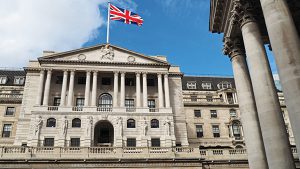Central banks are about to start withdrawing the stimulus they’ve pumped into their economies by buying bonds. For the Bank of England (BOE) in particular, reducing its balance sheet while simultaneously raising interest rates takes monetary policy into uncharted territory. Policy makers could quickly find themselves in the crosshairs, blamed for exacerbating the economic slowdown they’ve forecast.
The UK central bank, already well into its interest-rate hiking cycle, is about to accelerate the contraction of its £863 billion ($1.04 trillion) quantitative-easing portfolio. In March, it stopped reinvesting maturing debt; after its September 15 policy meeting, it plans to start selling gilts into the secondary market. The trouble is, because the past 13 years have seen nothing but more and more QE, first in the wake of the global financial crisis and then to keep growth alive during the pandemic, nobody knows the economic impact of taking away £80 billion — close to $100 billion — of central bank liquidity annually.
The BOE has been very careful to draw a distinction between its main policy tool of interest rates, and this supplementary measure of so-called quantitative tightening (QT).
While it says it doesn’t expect QT to have much influence on monetary conditions, in reality it’s guessing. If liquidity in the banking system dries up, this could very easily become a political football.
These are dangerous waters: The Federal Reserve’s first two attempts at QT had to be stopped and, ultimately, reversed. How smoothly the BOE can run down its balance sheet without provoking a bond-market tantrum, when the Fed is also trying to offload $95 billion a month from its $9 trillion balance sheet, remains to be seen. One thing for sure is that getting central bankers to put a number on the effect of unwinding their bond holdings, in equivalent terms to a change in official interest rates, has proved elusive.
The most specific QE calculation came from former BOE Governor Mark Carney. In a January 2020 speech, he said the central bank estimated that every £25 billion of bond purchases had the same effect as 25 basis points of rate cuts. Fed Chair Jerome Powell, at his May 4 press conference, estimated that
$1 trillion of QT equates to a single 25 basis-point rate hike. That disparity speaks volumes about the slipperiness of the prognosis.
The BOE will also dispose of its £19 billion of corporate bonds by April 2024. That may not sound much compared to the enormity of the BOE’s gilt holdings, but it may cause aftershocks in the sterling
investment-grade credit market, as that equates to two-thirds of the annual volume of corporate new issues. It could certainly cause credit spreads to widen and hamper prospective issuers if they are competing with the central bank for investor demand.
BOE Governor Andrew Bailey has made it clear that the central bank intends to retain a sizable bond portfolio, probably of the magnitude of the £450 billion it held prior to emergency pandemic support. Redemptions will reduce the QE pot by around £240 billion by 2026, with active sales of £160 billion easily completing the task.
Further reduction in the BOE’s balance sheet will come from expiry of pandemic support given directly to banks and corporates, with the bulk of about £192 billion outstanding from the Term Funding Scheme running off over the next three years. Liquidity in the banking system is going to have to be managed carefully.
The Monetary Policy Committee says the planned bond disinvestments can be suspended in periods of market stress, but Deputy Governor Dave Ramsden said there was a “high bar†to stopping sales even if the BOE switched direction on interest rates and started lowering borrowing costs. More than a decade of ever-increasing balance sheets suggests that may turn out to be wishful thinking.
It could all go right, with the market absorbing the additional gilt supply and the financial sector coping with the reduction in liquidity. But the constant
reliance on monetary largesse in the past several years hardly instills confidence that the already struggling UK economy can handle the twin headwinds of stimulus withdrawal and higher borrowing costs. As the old maps used to say, Here Be Dragons.
—Bloomberg
Marcus Ashworth is a Bloomberg Opinion columnist covering European markets. Previously, he was chief markets strategist for Haitong Securities in London
 The Gulf Time Newspaper One of the finest business newspapers in the UAE brought to you by our professional writers and editors.
The Gulf Time Newspaper One of the finest business newspapers in the UAE brought to you by our professional writers and editors.

